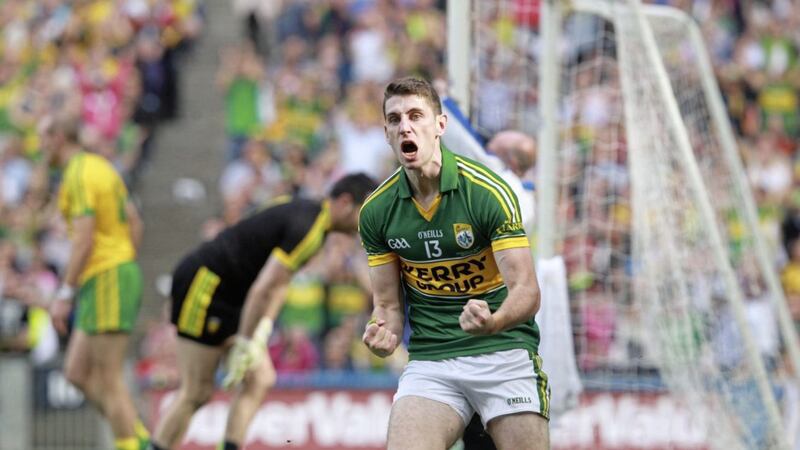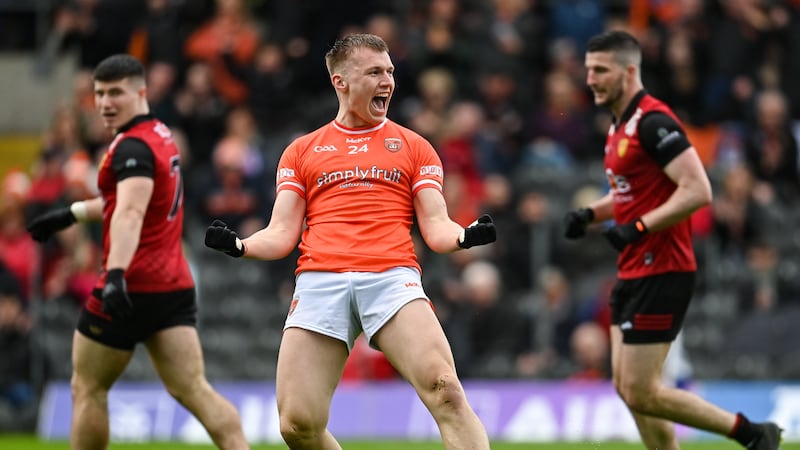IF Gaelic football was a product on the supermarket shelves, you can be pretty sure nobody would buy it.
The packaging would be solid grey. It would come with a more stringent health warning than 20 Mayfair. Everything about it would scream ‘no’.
And yet for those that saw past the drudge to buy it and opened it with an open mind, there would be a thoroughly satisfying experience.
The modern parlance that surrounds the sport is grey. The 1970s are depicted as being all blue sky. Them bad boys from Tyrone and Armagh brought the clouds overhead 15 years ago and they haven’t cleared since.
With every passing Sunday, the colour in the faces of Pat Spillane and Colm O’Rourke drains further. They sit in The Sunday Game studio like men waiting for a bad game to happen so that they can keep the narrative alive.
The public psyche has been deeply affected by years of negativity. The same wheels have been turning in society generally.
Most things in life have come to feel like a chore because we’re repeatedly told that’s what they are. Life itself seems to weigh so much more heavily on the millennial generation.
It comes from the negative image portrayed of pretty much everything.
Take the John McEnroe-Serena Williams row last week. It’s easier to take the McEnroe line out of context and create a storm about gender equality. That feeds the sharks better than the actual interview transcript, which reflects in nowhere near the same way on McEnroe.
GAA commentary has been stuck in a dead end for years. It’s like a tape that’s been jammed since August 2011.
After the Cork bulldozers had rolled in to present the briefest of obsessions with upper-body bulk, Donegal brought grim death to Croke Park that day against Dublin. Nobody denies that. They wouldn’t dare argue themselves.
The game has moved on massively in the six years since. The same Donegal brought it back as quickly as the following year, when it was all about the frightening pace of the counter-attack.
Football is already in a different world altogether than it was in 2011.
Yet so much of the commentary around it is still grounded in the same negative terms.
It’s hard to believe that the term ‘blanket defence’ is still a thing.
Why are teams lambasted for setting up with one eye on not allowing teams to rip a hole down the middle of their defence?
If there is such a thing as defensive football now, it exists only in the lower levels. Even the club game is catching up with the latest trend too, as it tends to do fairly quickly.
Gaelic football now is a counter-attacking game, not a defensive one.
It has materially changed, probably forever. Whether teams decide to run the ball or, as Down did so successfully last weekend, kick it, there is and always will be an emphasis on defence.
Unquestionably there were a couple of seasons where the emphasis on attacking fell by the wayside.
Almost every manager the country over tried to copy Donegal and everyone became so preoccupied with getting behind the ball that they forgot to concentrate on getting in front of it again.
It was inevitable. Football was going through the biggest change it’s ever had. It was like a sporting adolescence. It takes time to adjust to it all.
But slowly the new pupae found their wings. With all things there must be balance. And through old beacons of hope like Dublin, Mayo and Kerry, the new age was unfurled.
Not one of them plays 15-on-15 football. And yet it doesn’t matter. Look at last year’s final. Look at the Dublin-Kerry semi-finals of 2017 and 2013. Two of the greatest games of football ever played. There’s nothing from the 1970s that would ever touch them for relentless entertainment.
The highlights reel of the 1977 semi-final between those two, regarded by that generation as the greatest game ever, begins with a sequence of mistakes.
Mikey Sheehy miskicks a short free and gives the ball back to Dublin. Anton O’Toole’s ball into the Dublin forwards is intercepted. Ger O’Keeffe slips and loses the ball. Jimmy Keaveney is played in on goal and fires wide.
Modern coaching has put an emphasis on the reduction of errors, yet that’s held up as a negative.
They talk about the basic skills but as Down and Tyrone and Kerry and Dublin have all shown over the past three weeks alone, they are still very prevalent in 2017.
Look at some of the kick-passing in those games. Kerry in the first ten minutes against Cork on Sunday never missed a beat. All one-hop, instep passes to the full-forward line, whose movement was incredible.
Paul Geaney scored 1-4 from play. Imagine if he’d played in an era where he was left one-against-one. The scoring tallies put up by modern forwards are remarkable given the pressure they face every time they touch leather.
Colm Cavanagh’s fielding against Donegal; the man-marking performances of Darren O’Hagan for Down; Eoghan O’Gara’s catch, turn and finish at the Canal End.
The basic skills are there. To use the boot simply didn’t pay for a couple of years but now that there is space opening up, this generation of players are proving that, on the whole, they are the best ever to have played the sport.
This has been the highest scoring Championship on record so far. In the National League, teams scored more than 17 points in a game 97 times this year. Kildare’s 0-16 was the lowest tally in the four League finals.
Yet the commentary around the game is so depressingly and needlessly negative. The game has changed but the language hasn’t. Time to change the record.









